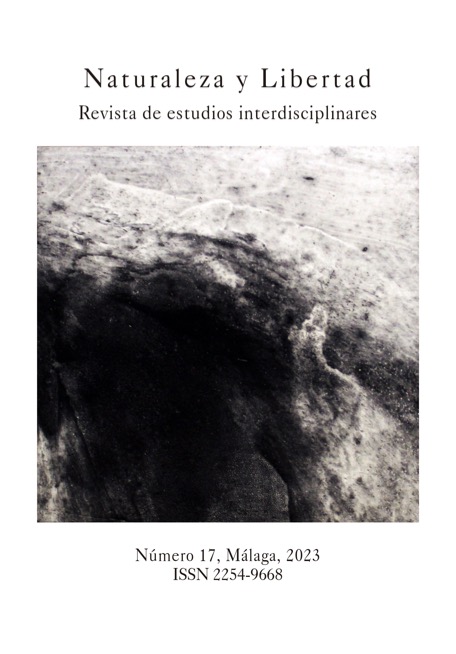Human and non-human political animals: Aristotle’s “metaphysical biology” as the basis of political animality
DOI:
https://doi.org/10.24310/NATyLIB.2023.vi17.16505Keywords:
political animal, Aristotle, politics, nature, ergon, non-human animalAbstract
In one of the most famous passages of the Politics, Aristotle claims that “man is a political animal” (zoon politikòn) (Pol. I.2 1253a4). Having led to countless interpretations, this formula is still a matter of contention. In this paper, some of the main interpretive strategies will be presented and evaluated. The first section will outline three major ones: the exclusive, the inclusive, and a wider, zoological one (or what might be termed as the “common ergon” interpretation). The rest of the paper will support a biological interpretation of zoon politikòn, which places a central emphasis on Aristotle’s literal treatment (as opposed to metaphoric) of some non-human animals as political in some of his biological works as well as in the Politics. The categorisations of human and non-human political animals in History of Animals suggest a complex non-dualistic picture, which entails the possibility of some humans becoming non-political and some animals being fully political. While providing a literal biological interpretation of political animality, it will also be necessary to specify that Aristotle’s biology is a “metaphysical biology”, as MacIntyre put it (2007). It is not a modern, evolutionary kind of biology, and it is grounded in a broader metaphysical concept of nature.
Downloads
Metrics
References
Aristotle (2002) Historia Animalium. Ed. and trans. by David M. Balme. Cambridge: Cambridge Press
Aristotle, (2009) Nicomachean Ethics. Trans. by W. D. Ross, Introduction and notes by Lesley Brown. Oxford: Oxford University Press
Aristotle (2009) Politics. Trans by Ernest Barker, Introduction and notes by R. F. Stalley. Oxford: Oxford University Press.
Abbate, C. E. (2016) “"Higher" and "Lower" Political Animals: A Critical Analysis of Aristotle's Account of the Political Animal” Journal of Animal Ethics, 6(1), 54-66. University of Illinois Press in partnership with the Ferrater Mora Oxford Centre for Animal Ethics. https://www.jstor.org/stable/10.5406/janimalethics.6.1.0054
Achtenberg, D. (1992) “On the metaphysical presuppositions of Aristotle's Nicomachean Ethics” The Journal of Value Inquiry, 26: 317-340. Kluwer Academic Publishers. https://doi.org/10.1007/BF00140935
Arnhart, L. (1994) “The Darwinian Biology of Aristotle's Political Animals”. American Journal of Political Science 38 (2), 464-485.
Baker, S. (2015). The Concept of Ergon: Towards an Achievement Interpretation of Aristotle’s ‘Function Argument’. In Oxford Studies in Ancient Philosophy, Volume 48. Oxford University Press.
Balme, D..M. (1962). Development of Biology in Aristotle and Theophrastus: Theory of Spontaneous Generation, Phronesis, 7(1-2), 91-104. https://doi.org/10.1163/156852862X00052
Balme, D. M. (1980). “Aristotle’s Biology was not Essentialist”. Archiv für Geschichte der Philosophie, 62(1), 1-12. https://doi.org/10.1515/agph.1980.62.1.1
Bennington, G. (2011) “Geoffrey Bennington. Political Animals. 2011” European Graduate School Video Lectures https://www.youtube.com/watch?v=ZxY3iNeQ0zA
Cooper, J. (1988) “Metaphysics in Aristotle's Embryology”. Proceedings of the Cambridge Philological Society, 34, 14-41. doi:10.1017/S0068673500005022
Depew, D. J. (1995) “Humans and Other Political Animals in Aristotle's "History of Animals"”. Phronesis 40 (2), 156-181. Brill. Stable URL: https://www.jstor.org/stable/4182496
Keyt, D. (1987) “Three Fundamental Theorems in Aristotle's "Politics"” Phronesis, 32(1), 54-79. Brill. http://www.jstor.org/stable/4182267
Labarrière, J. (2016). “Que fait la nature en politique selon Aristote ? Retour sur la définition de l’homme comme « animal politique par nature »”. Revue de philosophie ancienne, 34(2), 141-160. doi:10.3917/rpha.342.0141.
Lennox, J. G. (1980) “Aristotle on Genera, Species, and “the More and the Less”” Journal of the History of Biology, 13 (2) (Fall 1980), pp. 321- 346
Lennox, J.G. (2012). “Aristotle's Biology and Aristotle's Philosophy” in A Companion to Ancient Philosophy (eds M.L. Gill and P. Pellegrin). doi:10.1002/9781444305845.ch16
Leroi, A. (2020) “Aristotle's Biology — Armand Leroi / Serious Science” Serious Science. https://www.youtube.com/watch?v=frVUd4V5ZTk
MacIntyre, A. (2007) After Virtue: A Study in Moral Theory, Third Edition. University of Notre Dame Press
Mayhew, R. (1997) “Part and Whole in Aristotle‘s Political Philosophy”. The Journal of Ethics 1, 325–340. https://doi.org/10.1023/A:1009743012461
Miller Jr., F. D. (1989). “Aristotle's Political Naturalism” Apeiron, 22(4), 195-218. doi: https://doi.org/10.1515/APEIRON.1989.22.4.195
Mulgan, R. G. (1974) “Aristotle's Doctrine That Man Is a Political Animal”. Hermes, 102. H. 3, 438-445. Franz Steiner Verlag, https://www.jstor.org/stable/4475868
O’Rourke, F. (2012) “Aristotle’s Political Anthropology” in Politics of Practical Reasoning Integrating Action, Discourse and Argument, eds. Ricca Edmondson and Karlheinz Hülser, 17-38. Plymouth: Lexington Books
Schofield, M. (2006) “Aristotle’s Political Ethics” in The Blackwell Guide to Aristotle’s Nicomachean Ethics, ed. Kraut, R., 305-322. Oxford: Blackwell Publishing Ltd.
Downloads
Published
How to Cite
Issue
Section
License
Copyright (c) 2023 Nature & Freedom. Journal of Interdisciplinary Studies.

This work is licensed under a Creative Commons Attribution-NonCommercial-ShareAlike 4.0 International License.
Those authors who have publications with this journal, accept the following terms:
1. Copyright and licensing information are clearly described on the journal’s web site: all content published in Naturaleza y Libertad is open acces without limit, and are subject to the Attribution-NonCommercial-ShareAlike 4.0 International (CC BY-NC-SA 4.0) license. The full text of which can be consulted at https://creativecommons.org/licenses/by-nc-sa/4.0/
2. It is the responsibility of the authors to obtain the necessary permissions for the images that are subject to copyright. The authors whose contributions are accepted for publication in this journal will retain the non-exclusive right to use their contributions for academic, research and educational purposes, including self-archiving or deposit in open access repositories of any kind. The electronic edition of this magazine is edited by the Editorial de la University of Malaga (UmaEditorial), being necessary to cite the origin in any partial or total reproduction.
3. This journal allows and encourages authors to publish papers on their personal websites or in institutional repositories, both before and after their publication in this journal, as long as they provide bibliographic information that accredits, if applicable, your posting on it.
4. In no case will anonymous papers be published.






18.png)













